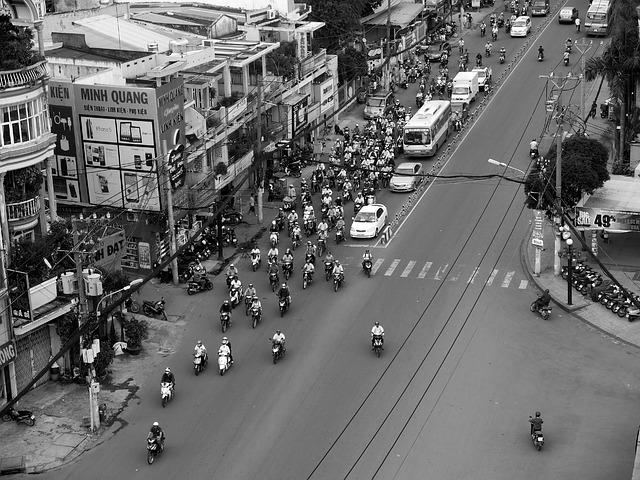Vietnam: Asia’s unexpected peace broker?
Posted By Helen Clark on June 9, 2017 @ 12:30

Vietnam’s Prime Minister Nguyen Xuan Phuc has just concluded a visit to the United States [1] to meet the president and negotiate a way forward on trade and the South China Sea—two issues central to Vietnam. In the end the South China Sea took a backseat to trade. North Korea also proved to be a major talking point. Washington has been seeking support to pressure North Korea to drop its nuclear and missile programs.
Hanoi has condemned all North Korean missile tests and stated on 30 May, a day after Phuc arrived in Washington, that it was ‘deeply concerned’ that the DPRK was ‘violating relevant resolutions of the UN Security Council. Viet Nam consistently supports all efforts aiming to promote dialogue and maintain peace and stability on the Korean Peninsula.’
Until the USN’s recent FON [2]patrol [2], Vietnam worried that the SCS might be taking a permanent backseat to the DPRK in Washington’s regional discussions, allowing greater Chinese hegemony in return for help on North Korea. Hanoi steadfastly maintains that UNCLOS should be the guiding principle, and it also values a strong US American deterrent presence there. That reference to the UN and international norms shows its ongoing commitment to multilateralism and the UN (when it suits—human rights and freedom of religion, not so much).
The idea that Hanoi could help with North Korea, possibly using its old (though frayed) ties to begin discussions, popped up [3] at The Huffington Post. But the author, who said the idea had been floated in Vietnam, didn’t attribute provenance. (Another writer at [4]The Diplomat [4]suggested the same thing last year.)
Were it possible, it would be a great coup for Hanoi and would help bring Vietnam, China and the US together. And it wouldn’t be the first time in that kind of role: Vietnam also hosted reconciliation talks between North Korea and Japan some years before.
Superficially, Vietnam could be a sensible choice. Both communist nations fought a civil war and against the United States, both under charismatic leaders. But there are also stark differences—not just of hardline communism versus the type that lets McDonalds in. It’s also a difference in foreign policy, between isolationism and multilateralism, ‘more friends and fewer enemies’ versus… mostly enemies. The difference in leadership is profound too: between a hereditary communist leadership, and a model that favours consensus among Politburo members.
Yet North Korea was a watcher of Vietnam’s post-war renovation and its 1975 reunification. In 2007 then PM Kim Yong-il visited, flying in on an old Tupolev plane, which the BBC described [5] as the kind of ‘bleak reminder’ of a time before the country modernised.
‘I think there is currently great interest in North Korea in Vietnam’s way of economic reform,’ Hwang Gwi-yeon, a professor in international relations at the Pusan University of Foreign Studies, South Korea, told the BBC at the time. ‘The situation in North Korea is similar to that in Vietnam many years ago and Vietnam has provided a very suitable model of development.’ Vietnam’s command economy capitalism was exciting to North Korea, coming a few years after it had tentatively tried its own version of a Chinese-style Special Administrative Region that went awry.
Those ideas are 10 years old, and haven’t made much of a resurgence under Kim Jong-un. Instead, things have atrophied further, despite Vietnam’s support for North Korea’s membership of the ASEAN Regional Forum. North Korea’s failure to pay for a large shipment of rice in 1996 set ties back, making the old comrade seem unreliable. Vietnam isn’t in the Chinese position of having to prop up the regime, and it doesn’t have as much to worry about regarding a huge influx of refugees, though it has been part of the Southeast Asian route out, and flew a large group out to South Korea in 2004.
A 2006 International Crisis Group report, which looked at the plight of North Korean refugees around the world, noted that Vietnam apparently regarded the relationship as ‘a burden’ at times, and required North Korean officials traveling to Vietnam on Hanoi’s coin to take a train. The report observed that
‘…since 2004, when South Korea took hundreds of North Korean refugees from Vietnam to Seoul, Vietnam has been especially cautious to avoid the risk of having to publicly choose between Pyongyang and Seoul.’
Vietnam’s ties with South Korea are strong, though largely business-based, despite having established a ‘strategic partnership’. Seoul made vague overtures about Vietnamese support regarding North Korea earlier this year [6], even as Vietnam wondered about more South Korean support in the South China Sea. Most analysts tend to think that as ties with South Korea—by far the largest investor in Vietnam—have progressed, friendship with the North has fallen by the wayside. But those residual ties might have some value, and any brokering by Vietnam would be very well received by the US, China and South Korea, especially under the more liberal leader Moon Jae-in, who values the idea of dialogue with the North.
The notion of Hanoi as broker between Washington and Pyongyang has great symbolic value for Washington: the former enemy is now moving so fast towards capitalism that its Prime Minister goes to Washington to promote free trade to the US President [7], while working the middle ground to bring peace and stability. And Vietnam, which is always looking for useful ways to improve its world role and its ties, would also benefit greatly.
Article printed from The Strategist: https://aspistrategist.ru
URL to article: /vietnam-asias-unexpected-peace-broker/
URLs in this post:
[1] visit to the United States: https://www.reuters.com/article/us-usa-vietnam-analysis-idUSKBN18V0AC
[2] recent FON : http://thediplomat.com/2017/05/the-trump-administrations-first-south-china-sea-fonop-is-here-first-takeaways-and-analysis/
[3] popped up: http://www.huffingtonpost.com/llewellyn-king/vietnam-wants-to-be-americas_b_11350456.html
[4] Another writer at : http://thediplomat.com/2016/09/can-vietnam-help-mediate-with-north-korea/
[5] the BBC described: http://news.bbc.co.uk/2/hi/asia-pacific/7068188.stm
[6] Seoul made vague overtures about Vietnamese support regarding North Korea earlier this year: http://www.atimes.com/article/south-korea-vietnam-aim-muscular-ties/
[7] promote free trade to the US President: http://in.reuters.com/article/usa-vietnam-idINL1N1IY01O
Click here to print.